German Red Army Faction radicals 'bungled armed robbery'
- Published
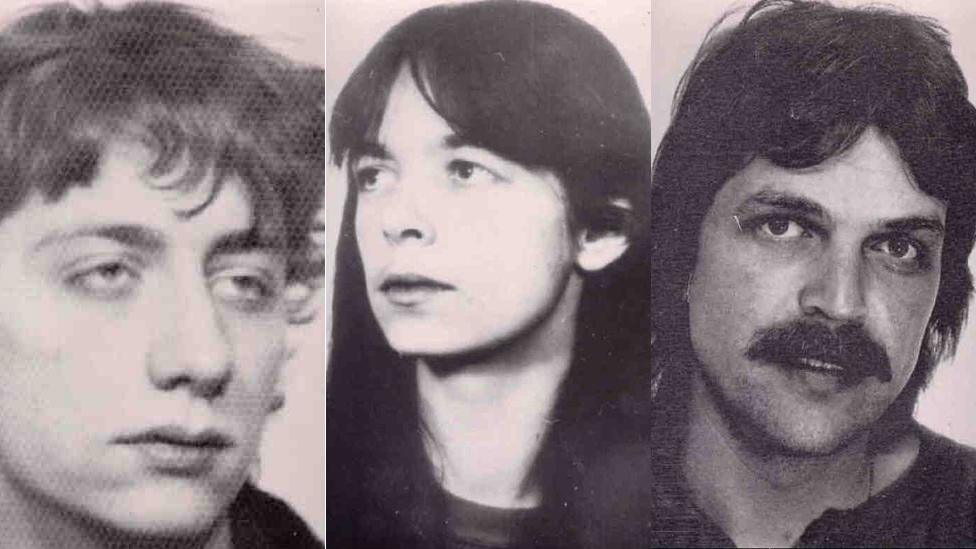
Wanted far-left militants (left to right): Burkhard Garweg, Daniela Klette and Ernst-Volker Staub
A botched armed robbery in north Germany last June was the work of three wanted militants from the far-left Red Army Faction (RAF), police say.
The RAF, also called the Baader-Meinhof gang, killed more than 30 people in an anti-capitalist terror campaign in the 1970s and 80s.
In 1998 an RAF declaration said the "urban guerrilla project" had ended.
Shots were fired at an armoured security van near Bremen last June, but the militants could not open its doors.
The three fled the scene - a supermarket car park in Gross Mackenstedt - in a Ford Focus, having failed to grab the estimated €1m (£770,000; $1.1m) in cash that was inside the van. The two security men inside were unhurt, German broadcaster NDR said.
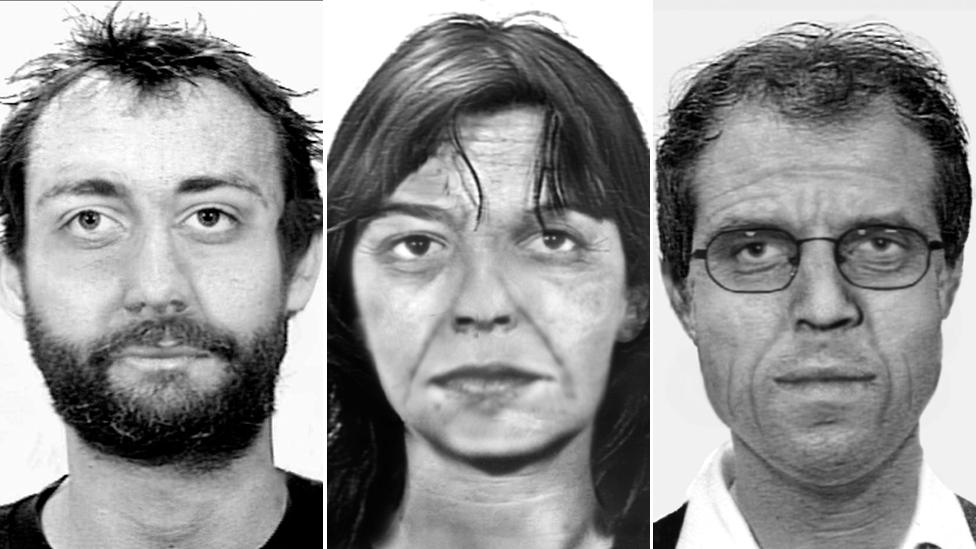
German police released simulated images of what (L-R) Burkhard Garweg, Daniela Klette and Ernst-Volker Staub would look like now
Police have only now identified the robbers' DNA from fingerprints, naming the suspects as ex-RAF militants Ernst-Volker Staub, 58, Daniela Klette, aged 57, and Burkhard Garweg, whose age is unknown.
Experts on the RAF believe the militants may be running out of money as they get older, and not that they are staging robberies in order to finance a new urban guerrilla campaign.
The trio are also being linked to a failed robbery in Wolfsburg last month.

Who were Germany's Red Army Faction?
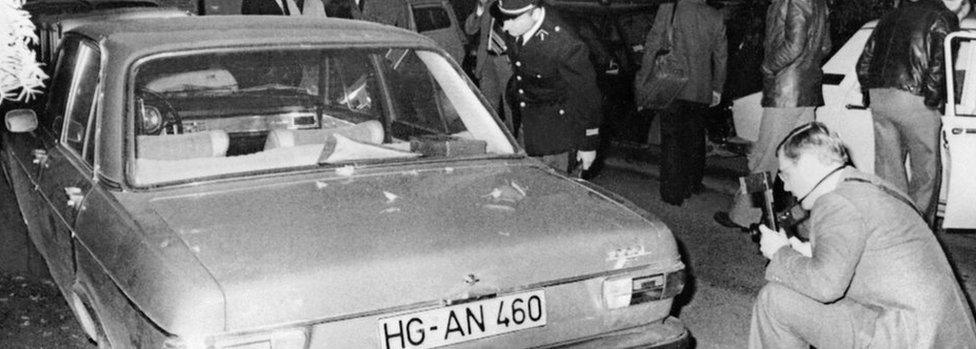
RAF militants murdered German industrial leader Hans Martin Schleyer in 1977 and dumped his body in an Audi car
Born from the radical student movement of the late 1960s, the RAF comprised mainly middle-class youngsters who saw themselves as fighting the West German capitalist establishment.
They had links with radical Arab militants in the Middle East and targeted German bankers, businessmen, judges and US servicemen.
At the peak of the group's popularity, around a quarter of young West Germans expressed some sympathy for the militants.
Their critics denounced them as murderous nihilists - desperate for a cause but with no real political goals.
Red Army Faction: Germany's most infamous far-left guerrilla group

CCTV evidence
According to investigators, the militants drove up to the security van last June in a VW van, which they then reversed into a wall, blocking the target vehicle.
Video footage from surveillance cameras showed the three masked assailants holding two Kalashnikov assault rifles and a grenade launcher.
At least three shots were fired - a bullet burst one of the van's tyres, another shattered the windscreen and a third was found embedded in the van's armour.
The Ford Focus getaway car was found abandoned a week later in woodland near Gross Ippener - about nine minutes' journey from the crime scene.
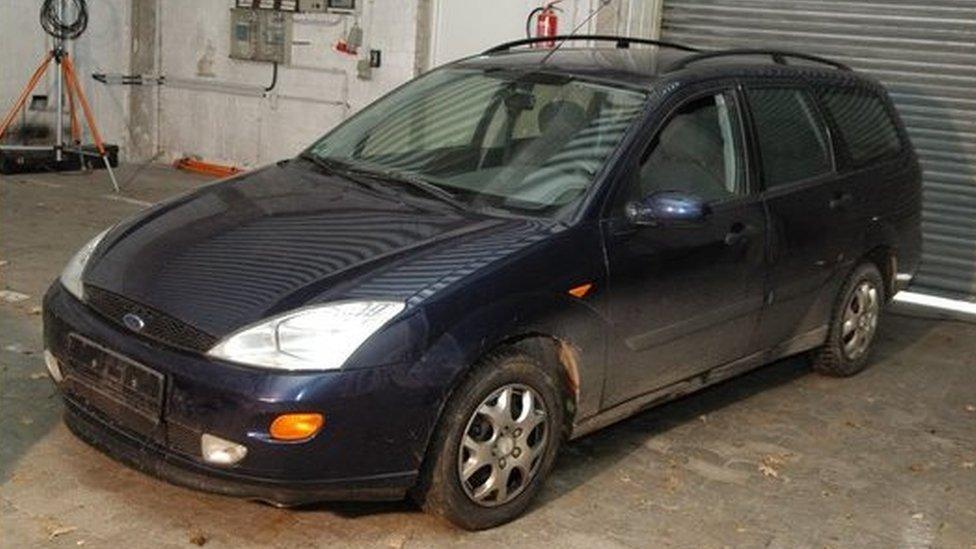
A Ford Focus, later found abandoned, was also used as a getaway car in an attempted robbery near Wolfsburg last month
The June raid near Bremen is now being linked to two other attacks, one in late December and another dating back 17 years.
DNA from two of the three militants, Klette and Staub, was apparently found after an armed robbery in Duisburg, in the Ruhr region of western Germany, in 1999.
On that occasion the robbers made off with 1m German marks (approximately €500,000).
'Making ends meet'
Last month three masked attackers armed with automatic weapons and a grenade launcher threatened another armoured van carrying cash in Nordsteimke near Wolfsburg.
There were obvious similarities with the raid last summer, some 200km (125 miles) to the north-west.
Again they targeted a van leaving a supermarket with the day's takings. Again they fled empty-handed when the van's driver drove off.
State prosecutor Lutz Gaebel said on Tuesday that latest DNA test results meant that police "have to assume there's a link" with the bungled raid last summer.
His verdict was there was "no indication of terrorist activities" but rather that the gang were looking for money to make ends meet.
The German criminal police - BKA - has put wanted notices on the internet , externalfor the three, offering rewards for information that leads to their capture.
- Published19 January 2016
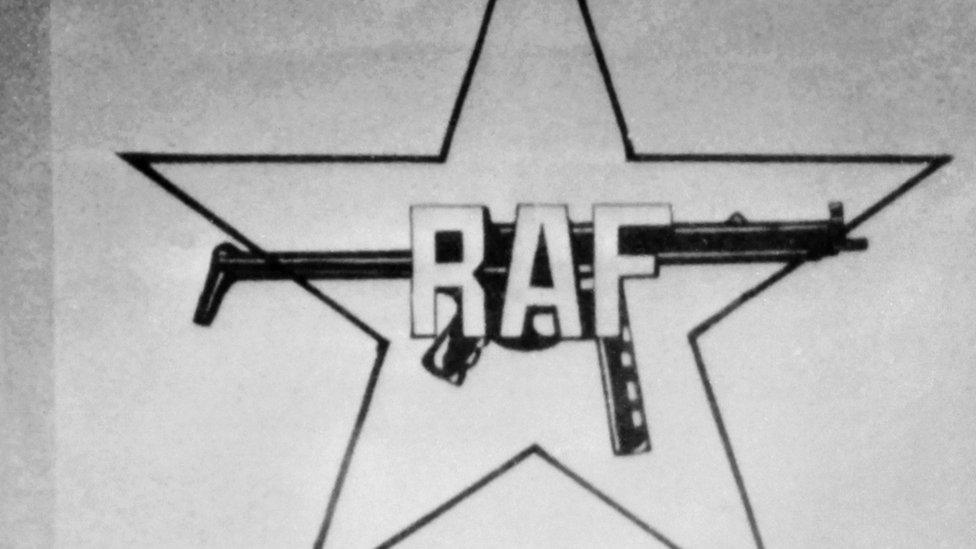
- Published30 September 2010
